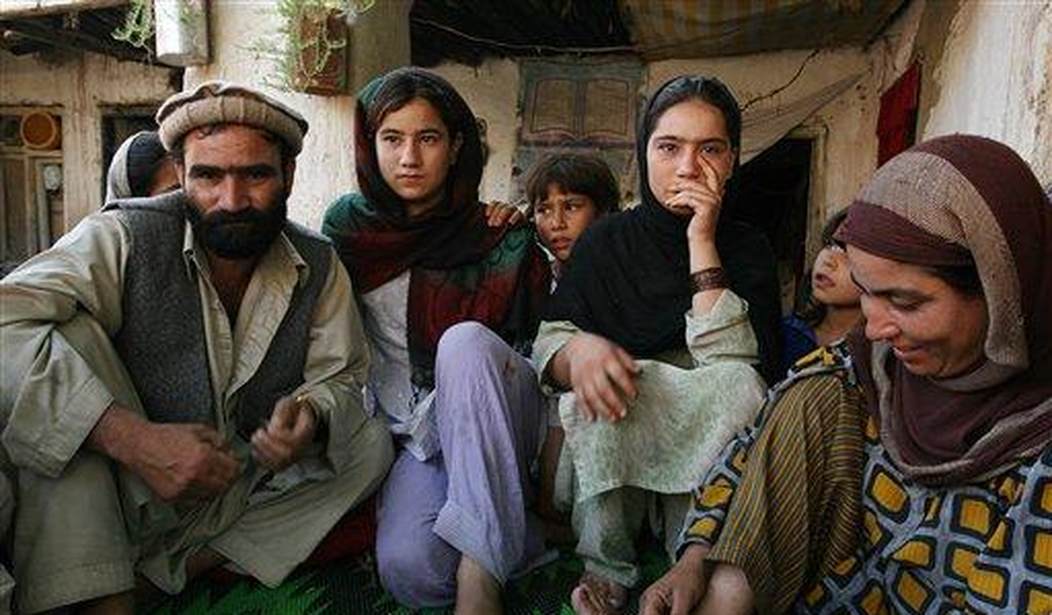One year after the Biden administration’s disastrous withdrawal from Afghanistan, new reports are showing how women and girls have suffered under the Taliban’s rule.
Speaking to NPR on Sunday, Pashtana Durrani, executive director of LEARN, a nonprofit in Afghanistan that helps Afghan girls access education, said that girls in Afghanistan have been blocked from going to school since last year. Last October, Durrani told NPR that most Afghan girls “loved” going to school.
“Afghanistan is the only country right now that is stopping its own girls from going to school,” Durrani told NPR on Sunday, adding that she feels a sense of “grief” and “loss.”
“In the '90s, the Taliban were in power. Women were still running secret schools. And the same is happening right now,” Durrani added. “We might be the last generation, when it comes to structured, accepted learning where our degrees might have been accredited by the Education Ministry from Afghanistan. But I do believe that learning will continue in many forms.”
Durrani explained that the underground girls’ schools up and running now are not the exact same as the schools in the 1990s.
“The different models that we are studying right now is that when there are a lot of digital classes and schools that we are seeing. The second trend is, like, when teachers teach them in-person, within the houses. The third is that they send homework packages to each other's houses. And the fourth one is, like, they study through radio lessons. So these are all different trends that are coming right now,” she said.
Recommended
Save the Children International tweeted on Tuesday that 46 percent of girls in Afghanistan are not in school, compared to 20 percent of boys.
Our new report "Breaking point: Life for children one year since the Taliban takeover" found 46% of girls in #Afghanistan aren't in school, compared to 20% of boys.
— Save the Children International (@save_children) August 10, 2022
Education is a lifeline for children, especially girls.
The Taliban must allow all girls to return to school. pic.twitter.com/TIZthVY36n
A 16-year-old girl, Farkhunda, whose name has been changed to protect her identity, told The Guardian’s Emma Graham-Harrison this week that women are beaten in the street just for smiling or for the clothes they are wearing. She said it’s better to stay at home and than to leave the house and run into members of the Taliban.
Women face harsher restrictions here than anywhere else in the world, barred from secondary education and most work outside healthcare and education. They are forced to be accompanied by a male guardian for all but short journeys and required to cover their faces in public.
Restrictions are enforced intermittently but, particularly for poorer and more vulnerable women including those without a guardian, the fear of enforcement alone can be crippling.
“Three times now I’ve seen women being beaten in the market by Taliban. Some were wearing trousers they thought were too tight, you should have seen how broken they were afterwards,” said Farkhunda*, 16, who had to stop school in September and has been battling depression.
“Another time they beat girls just for smiling and talking too loud. It’s a natural thing to chat about dresses you are buying and things,” she said.”
She doesn’t have Taliban-regulation long, black abaya and the family can’t afford to buy one. “Since then I’ve even stopped going to study at the madrassa [religious school], it’s better to be at home than run into these animals,” she said.
Last year, CNN’s Clarissa Ward reported from Afghanistan when the Taliban took Kabul. She asked members of the Taliban how women will be treated going forward.
“The females, the women, can continue their life,” Assad Massoud Khistani, a member of the Taliban, said to Ward. “They can go to the schools, they can continue their education wearing Islamic hijab,” he added, saying that girls will have to cover their faces.
Ward returned to Afghanistan this month, one year after the withdrawal. She says that the future of girls in the country looks “grim.”
“There is no immediate plan for her [a 10-year-old Afghan girl] to be able to go to school after sixth grade. We hear anecdotally stories of girls deliberately trying to fail their fifth grade classes so that they can be allowed to repeat the year,” Ward said on-air in Afghanistan on CNN this week.
"We know of many cases of girls and women who are coming together to set up underground schools where girls can go and learn in a sort of clandestine environment," she continued. "But, I think that the heartbreak for so many here is that for the 20 years that the U.S. and its allies had a presence in Afghanistan…there was still a chance for women and girls that you could dare to dream.”
ONE YEAR LATER: @clarissaward reports on the state of women in Afghanistan.
— Nora Neus (@noraneus) August 11, 2022
"All girls above the age of 12... instead of going to school and instead of going to work, they must now stay home."pic.twitter.com/ZmINwXaOB2

























Join the conversation as a VIP Member